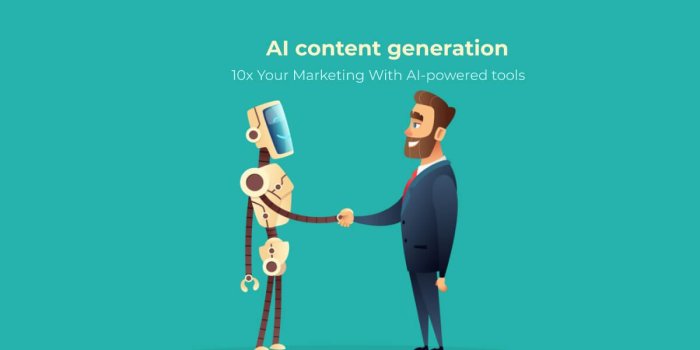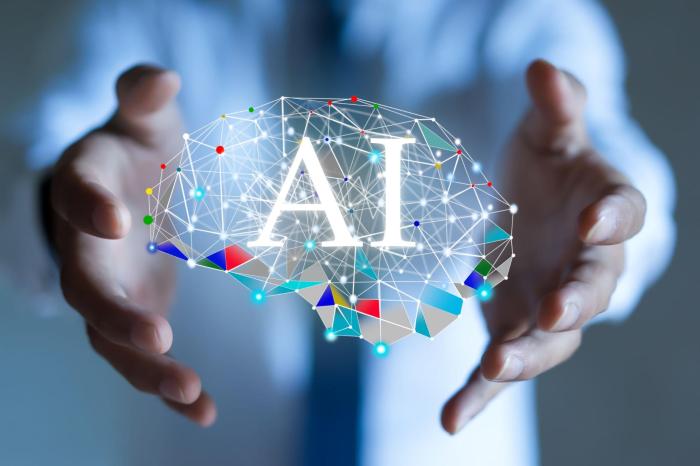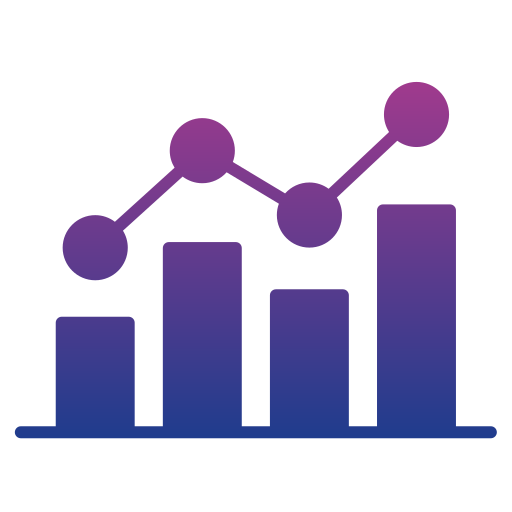AI-driven content optimization is transforming the way businesses approach digital marketing, leveraging the power of artificial intelligence to create, optimize, and distribute content that resonates with target audiences. This innovative approach goes beyond traditional content strategies, employing sophisticated algorithms to understand user behavior, predict trends, and personalize content for maximum impact.
By analyzing vast amounts of data, AI algorithms can identify patterns and insights that would be impossible for humans to discern. This allows marketers to tailor content to specific demographics, interests, and even individual preferences, resulting in higher engagement, increased conversions, and ultimately, better business outcomes.
Introduction to AI-Driven Content Optimization
Content optimization is the process of improving the visibility and performance of online content to attract a larger audience and achieve specific goals. It involves various techniques to enhance search engine ranking, user engagement, and overall effectiveness. The evolution of content optimization has been driven by technological advancements, particularly the emergence of Artificial Intelligence (AI).
AI has revolutionized content optimization by automating tasks, providing data-driven insights, and enabling personalized experiences. This transformation has led to a new era of AI-driven content optimization, where machines play a crucial role in optimizing content for better results.
Benefits of AI-Driven Content Optimization
AI-driven content optimization offers several key benefits, including:
- Improved Search Engine Ranking:AI algorithms can analyze search engine algorithms and identify relevant s, optimize content structure, and enhance on-page factors, ultimately improving search engine rankings.
- Enhanced User Engagement:AI can personalize content based on user preferences, predict user behavior, and recommend relevant content, leading to increased user engagement and satisfaction.
- Increased Efficiency and Productivity:AI automates repetitive tasks such as research, content creation, and content scheduling, freeing up time for content creators to focus on strategic tasks.
- Data-Driven Insights:AI analyzes vast amounts of data to provide valuable insights into content performance, audience behavior, and industry trends, enabling data-driven decision-making.
AI-Powered Content Creation and Editing Tools

The advent of AI has revolutionized the content creation and editing landscape, offering powerful tools that can automate tasks, enhance efficiency, and elevate the quality of content. These tools leverage the power of machine learning to analyze vast amounts of data, understand patterns, and generate human-like text, making content creation and editing more accessible and effective.
Content Creation Capabilities of AI
AI-powered content creation tools are capable of generating various types of content, including articles, blog posts, social media captions, and product descriptions. These tools utilize natural language processing (NLP) algorithms to understand the context, tone, and style of the desired content and generate text that aligns with the specified requirements.
- Article Generation:AI tools can generate articles on a wide range of topics, from news and current events to technical reviews and educational content. They can gather information from various sources, structure the content, and create engaging and informative articles.
- Blog Post Creation:AI can assist in generating blog posts, providing ideas for topics, crafting Artikels, and even writing complete drafts. This can be particularly useful for bloggers who are looking to streamline their content creation process.
- Social Media Caption Generation:AI tools can generate engaging and attention-grabbing captions for social media posts, optimizing them for different platforms and target audiences. They can analyze trends, suggest relevant hashtags, and ensure that the captions are consistent with the brand’s voice and style.
- Product Description Generation:AI can generate compelling product descriptions that highlight key features, benefits, and selling points. These descriptions can be tailored to different audiences and platforms, ensuring that they are informative, persuasive, and engaging.
Content Editing Capabilities of AI
AI plays a crucial role in content editing, offering a range of functionalities that can enhance the quality, clarity, and effectiveness of written content. These tools can help identify and correct grammatical errors, ensure consistent style, detect plagiarism, and provide suggestions for content optimization.
- Grammar and Style Checks:AI-powered grammar checkers can identify and correct grammatical errors, including subject-verb agreement, tense consistency, and punctuation. They can also suggest improvements to sentence structure and style, ensuring that the content is clear, concise, and easy to understand.
- Plagiarism Detection:AI tools can effectively detect plagiarism by comparing the content against a vast database of online and offline sources. This helps ensure that the content is original and avoids copyright infringement.
- Content Optimization Suggestions:AI can analyze content and provide suggestions for optimization, including usage, readability, and (Search Engine Optimization) improvements. These suggestions can help improve the visibility and performance of the content online.
The Future of AI-Driven Content Optimization
The rapid advancement of AI technology is poised to revolutionize content optimization in ways we are only beginning to imagine. AI is rapidly becoming an indispensable tool for content creators, marketers, and businesses seeking to enhance their online presence and reach their target audiences effectively.
Advancements in AI Technologies and Their Impact
The future of AI in content optimization is brimming with exciting possibilities. AI technologies are constantly evolving, leading to increasingly sophisticated tools and capabilities. Here are some key advancements and their potential impact on content creation and distribution:
- Natural Language Processing (NLP) Enhancements:Advancements in NLP will enable AI to better understand and interpret human language, leading to more accurate and relevant content recommendations. AI-powered tools will become more adept at analyzing user intent, identifying key themes, and generating highly targeted content.
For example, AI could analyze customer reviews and feedback to understand their needs and preferences, then generate product descriptions that resonate with specific customer segments. This will enable businesses to create more personalized and engaging content.
- Content Personalization and Recommendation Engines:AI-powered personalization engines will tailor content to individual users based on their browsing history, preferences, and demographics. This will allow for more effective targeting and engagement, leading to higher conversion rates and improved user satisfaction. Imagine a travel website that uses AI to personalize trip recommendations based on a user’s previous travel destinations, budget, and interests.
This personalized approach would enhance the user experience and increase the likelihood of booking a trip.
- Automated Content Creation and Editing:AI-powered tools will automate tasks like content generation, editing, and proofreading, freeing up content creators to focus on more strategic tasks. While AI may not completely replace human creativity, it can streamline content creation processes, improving efficiency and productivity. For instance, AI can draft basic blog posts, social media updates, and even press releases, providing a foundation for content creators to build upon.
This allows content creators to focus on adding their unique voice and expertise to the content.
- AI-Powered Analytics and Reporting:AI will play a crucial role in analyzing content performance and providing actionable insights. Advanced analytics tools will track key metrics like engagement, conversion rates, and audience demographics, helping content creators optimize their strategies. This data-driven approach will allow for continuous improvement and ensure that content is aligned with business objectives.
Imagine an e-commerce platform that uses AI to analyze customer behavior on product pages. Based on this data, AI could suggest product recommendations, optimize product descriptions, and even personalize the user interface to improve conversion rates.
Ethical Considerations of AI-Generated Content, AI-driven content optimization
The widespread adoption of AI-driven content optimization raises important ethical considerations. As AI becomes more sophisticated, it’s crucial to address potential issues related to:
- Transparency and Disclosure:It’s essential to be transparent about the use of AI in content creation and ensure that users are aware when they are interacting with AI-generated content. This fosters trust and prevents misleading or deceptive practices. Imagine a news website that uses AI to generate articles based on real-time data.
The website should clearly disclose that the articles are AI-generated, allowing users to make informed decisions about the information they consume.
- Bias and Discrimination:AI algorithms are trained on large datasets, which may contain biases that can be reflected in the generated content. It’s crucial to address these biases to ensure that AI-generated content is fair, equitable, and inclusive. For instance, AI-powered content creation tools should be trained on diverse datasets to minimize the risk of perpetuating existing biases.
This includes ensuring that the datasets represent different perspectives, cultures, and identities.
- Copyright and Intellectual Property:The ownership and copyright of AI-generated content raise complex legal questions. It’s important to establish clear guidelines and regulations to protect both the creators and users of AI-generated content. For example, a content creator who uses an AI tool to generate an article may need to understand the ownership rights and potential copyright implications associated with the content.
Epilogue

As AI technology continues to evolve, the future of content optimization promises even more exciting possibilities. With advancements in natural language processing, machine learning, and deep learning, AI will become even more adept at understanding human language, generating compelling content, and optimizing for search engines.
This will empower marketers to create truly engaging experiences that connect with audiences on a deeper level, driving meaningful results for their businesses.
FAQ: AI-driven Content Optimization
What are some examples of AI-powered content creation tools?
Popular AI-powered content creation tools include Grammarly, Jasper, and Copy.ai. These tools can help generate various types of content, including articles, blog posts, social media captions, and product descriptions.
How does AI help with content distribution?
AI can analyze audience data and identify the most relevant channels for content distribution. It can also predict content performance and suggest optimal times for posting to maximize reach and engagement.
What are the ethical considerations surrounding AI-generated content?
Ethical concerns include potential biases in AI algorithms, the need for transparency in AI-generated content, and the potential for AI to replace human writers.
